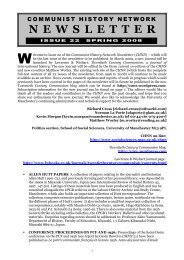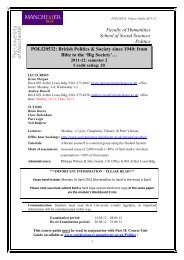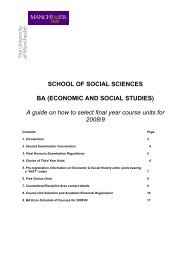second year course outlines 2012-2013 - School of Social Sciences ...
second year course outlines 2012-2013 - School of Social Sciences ...
second year course outlines 2012-2013 - School of Social Sciences ...
Create successful ePaper yourself
Turn your PDF publications into a flip-book with our unique Google optimized e-Paper software.
Examination period: Monday 13 th May <strong>2013</strong> – Friday 7 th June <strong>2013</strong><br />
Re-sit Examination period: Monday 19 th August <strong>2013</strong> – Friday 31 st August <strong>2013</strong><br />
Please read this <strong>course</strong> outline through very carefully as it provides essential information<br />
needed by all students attending this <strong>course</strong><br />
This <strong>course</strong> guide should be read in conjunction with the Philosophy Study Guide.<br />
Copies may be obtained from the Undergraduate Office, G.001 Arthur Lewis Building or from<br />
the SoSS intranet at: http://www.socialsciences.manchester.ac.uk/intranet/ug/handbooks/<br />
2. ABOUT THE COURSE<br />
Summary<br />
This <strong>course</strong> will focus on four questions <strong>of</strong> ethics: (i) which sorts <strong>of</strong> things are <strong>of</strong> ethical value<br />
and disvalue? (people? their actions? their intentions? their characters? the situations that<br />
they get themselves into?), (ii) what does their possessing this value demand <strong>of</strong> us? (e.g.<br />
that we bring about the greatest happiness <strong>of</strong> the greatest number? that we treat others as<br />
ends, not means? that we do unto others as we would have them do unto us?), (iii) how do<br />
these demands motivate our actions (e.g. by arousing our passions, or our reason?), and (iv)<br />
why does it matter to us that these demands are met (i.e. why do we care about the<br />
demands that are made by morality)?<br />
Aims<br />
The <strong>course</strong> aims to:<br />
• Guide students’ development in thinking philosophically about ethics.<br />
• Familiarise students with some important writings in contemporary philosophical ethics.<br />
• Enhance students’ ability to present and discuss philosophical issues orally, and their<br />
ability to present philosophical ideas and arguments in written work.<br />
Learning Outcomes<br />
On successful completion <strong>of</strong> this <strong>course</strong> unit, students will be able to demonstrate:<br />
• Knowledge and understanding <strong>of</strong> some <strong>of</strong> the main texts and ideas in contemporary ethics.<br />
• The ability to critically engage with these texts and ideas.<br />
• The ability to present and discuss orally the examined ideas.<br />
103

















